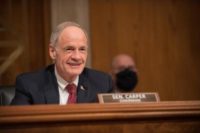Leaders of the Senate and House Appropriations Committee have reached an agreement on a "framework" for what would be a massive omnibus spending measure that would fund the government through next Sept. 30, the end of the 2023 federal fiscal year.
The legislators, who announced the bipartisan deal in the evening of Dec. 13, did not immediately say how big the package would be or provide specifics about its contents.
While congressional appropriators work to flesh out the framework with detailed bill language and line-item funding specifics for hundreds of federal programs, Congress also has approved one-week stopgap measure to keep the government operating while lawmakers hammer out the big package.
Federal agencies have been operating under a continuing resolution, or CR, which expires on Dec. 16. Their hope is that the new stopgap will give them enough time to finish negotiating a full fiscal 2023 omnibus measure.
The House on Dec. 14 passed the one-week CR on a 224-201 vote. One day later the Senate approved it on a 71-19 vote. President Joe Biden signed the measure on Dec. 16, before the deadline.
Senate Appropriations Committee Chairman Patrick Leahy (D-Vt.) said in a statement that the new omnibus framework "should allow us to finish an omnibus appropriations bill that can pass the House and Senate and be signed into law by the president."
The top Republican on Senate Appropriations, Richard Shelby (Ala.), confirmed that a framework deal had been reached and said in a statement, "If all goes well, we should be able to finish an omnibus appropriations package by Dec. 23."
House Appropriations Committee Chair Rosa DeLauro (D-Conn.) said that the framework "provides a path forward to enact an omnibus next week." Earlier in the day, DeLauro had unveiled the text of a one-week CR.
DeLauro said she and the other lead appropriators "will work around the clock to negotiate the details" of legislation that can clear both houses of Congress and be signed by President Joe Biden.
But House Minority Leader Kevin McCarthy (R-Calif.) and several other top GOP members of that chamber strongly oppose the omnibus framework.
McCarthy said in a Dec. 14 press briefing, "We can't afford to continue to spend the way the Democrats have."
He also opposed the short-term continuing resolution and instead favored a CR that would extent "further into the new year."
The text of this article was updated on Dec. 17, 2022, with Biden's signing of the stopgap bill.





